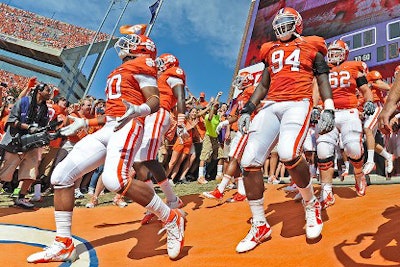 The Clemson University football team
The Clemson University football team 2015 APR Scores (Source: NCAA.org and Tidesport.org).
2015 APR Scores (Source: NCAA.org and Tidesport.org).As the Clemson University Tigers look to head into tomorrow’s Atlantic Coast Conference (ACC) championship game against the University of North Carolina at Chapel Hill, the top-ranked football team in the country has more than just a stellar season to celebrate. With a graduation rate of 84 percent (91 percent for all student-athletes), and an Academic Performance Rate (APR) that consistently ranks in the top 10 percent of all Football Bowl Subdivision (FBS) programs, Clemson’s football team is as much a model of success in the classroom as it has been on the field this year.
Athletic and academic reform reached a fever pitch with the passage of the 1990 Student Right-to-Know Act, which requires institutions to track the graduation and completion rates of all students by gender and race — especially student-athletes — and make said information available to the families of prospective recruits. Since then, colleges have come under even more scrutiny about the academic performance of their student-athletes.
That legislation brought to a national stage the urgency to clean up the academic performance of student-athletes participating in collegiate sports. The explosion of large numbers of sports networks and sports-related media such as ESPN, FOX Sports and countless sports talk radio programs only served to intensify that scrutiny.
Among schools that were most suspected of abuse were large public universities who populated their two revenue-producing sports, football and basketball, with highly talented, but academically challenged, athletes. Most of these athletes were African-American, adding another dimension of racial exploitation to the puzzle. The cynicism about the entire system became fodder for innumerable articles, documentaries and investigations.
But at Clemson, the impetus is as much on winning in the classroom as it is winning on the field. According to Assistant Athletic Director for Communications Joe Galbraith, the program boasts its highest graduation rate since the data was first released in 1998 — 84 percent, which is fourth among all Power 5 public institutions (ACC, SEC, Big 10, Big 12 and PAC-12).
“At every level, the importance is on getting a degree, on being a part of campus, on understanding you are here as a student, as well as an athlete, and that’s a culture that’s really important to Head Coach Dabo Swinney and the entire athletics staff, said Galbraith. “He stresses that daily. It isn’t something he only talks about in recruiting or only talks about around finals time, it’s something that permeates through the daily life.”
So far, it seems to be resonating. Of 120 seniors who have played football at Clemson, 115 have graduated with a degree.
“The other five are in the NFL and [Swinney] has made them promise to come back to finish” when their playing careers are over, said Galbraith.
“There are 65 schools Division 1 Power 5 schools, and I don’t think there’s anyone in the country that has the culture that we do,” said Associate Athletic Director of Athletic Academic Services Steve Duzan.
“Coach Swinney and his staff set the tone,” Duzan said, that “you’ve just got to be the best you.”
For Swinney, who was a walk-on player at the University of Alabama and who went on to earn a spot as a scholarship player, the recognition of the difference a college degree can make in one’s life is based on his own personal experience.
“He understands what opportunities [graduating from college] gave him, and he understands the opportunities it could mean for his young men,” Duzan said. “Education opens doors.”
But Duzan and the rest of the athletics staff recognize that as much as Swinney, it is the players themselves who make the strong academic culture a reality.
“First and foremost, the quality of the students we have [is key], because they’re the ones who do the work … and perform at a high level,” he said.
For a team in which the standard is to “not [to] just get by … but to graduate at a high level” and to leave young men empowered “with skills to be anything they want in life,” Duzan said there is a high emphasis on life after football.
“We want them to take the four years here and go on with the next 40 and do whatever they want with it,” he said. Citing the numerous awards for athletic accomplishments — both individual and collective — that team members are set to receive at the end of this season, Duzan said, “The message is none of this is a success unless you are a Clemson graduate.”


















